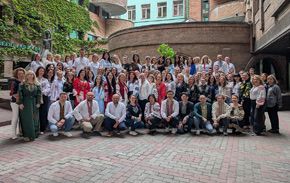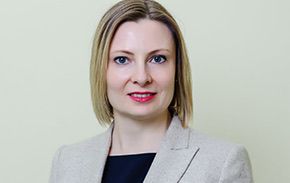Business Ukraine, June 2025
Against the backdrop of the ongoing war against Russia, Ukraine continues to make steady progress toward European integration. This historic EU accession process can play a key role in fueling the country’s recovery and future economic prosperity, says Credit Agricole Ukraine’s CEO and Chairman of the Management Board Carlos de Cordoue.
Credit Agricole was one among the first international bank to establish a presence in Ukraine following independence in the early 1990s and recently marked 32 years in the country. The bank has witnessed plenty of ups and downs during this period, including two revolutions and the past eleven years of escalating conflict with Russia, but has nevertheless managed to remain stable and profitable.
Looking back, Carlos de Cordoue argues that this consistently strong performance throughout modern Ukraine’s “turbulent history” has been in large part due to the remarkable flexibility of the Ukrainian economy, something that has come to the fore since the onset of Russia’s full-scale invasion in February 2022. “The way Ukrainians have adapted to the current situation, making big decisions to change fundamentals like their logistics operations and production facilities, has been amazing.”
Carlos de Cordoue says he has been particularly impressed by the wartime performance of Ukraine’s agricultural and IT industries, which he sees as key pillars of the Ukrainian economy along with the country’s rapidly emerging defense industry. He notes that Ukrainian IT companies and agribusinesses have proven themselves to be highly competitive on the global marketplace, and underlines that support for both sectors is central to the Credit Agricole strategy in Ukraine.
As the Ukrainian business community looks to adapt to new circumstances and rebuild, the bank has experienced a surge in demand for financing to support energy generation projects. In many cases, this involves backing initiatives aimed at enabling agribusinesses to become more energy independent and allowing them to reduce their reliance on a national power grid that has proven vulnerable to Russian air strikes. This makes good sense, especially as the necessary biomass materials are often readily available. “We support energy independence and promote sustainable consumption among our customers. We believe that it will help Ukrainian agribusiness to achieve the highest international standards of production by saving energy and resources and reducing carbon footprint,” comments Carlos de Cordoue.
One underdeveloped sector of the country’s financial services market that offers potentially exciting opportunities for Credit Agricole in Ukraine is the mortgage business. Carlos de Cordoue points out that while there is currently no full-fledged Ukrainian mortgage market to speak of, wartime realities look set to generate significant demand for such financing tools. With property damage and security concerns leaving millions of Ukrainians internally displaced and creating millions more refugees, there is likely to be unprecedented need for new housing in the coming years. “I strongly believe that there is an opportunity to create a mortgage market in Ukraine. This is an important part of the country’s reconstruction and would help to address the needs of the population.”
While there is currently no clarity on when Russia’s invasion may end or what form an eventual settlement could take, there is already anticipation that Ukraine’s future trajectory will be increasingly shaped by the country’s European integration. Ukraine has long identified joining the European Union as a core foreign policy objective, and has achieved a number of major breakthroughs toward this goal over the past three years. In June 2022, Ukraine was granted the status of official EU candidate country, with membership negotiations officially getting underway in summer 2024. More recently, EU officials have praised Kyiv’s approach to ongoing reforms, commenting that “Ukraine has done its homework” as accession talks continue to advance.
The pace of Ukraine’s progress has led to optimistic predictions that membership of the European Union may be possible before the end of the decade. While not everyone agrees that such forecasts are realistic, there is a growing sense that eventual Ukrainian EU accession is now a question of when rather than if. “The time frame is not yet confirmed, but the vision is already quite clear. Ukraine is moving rapidly in the direction of Europe,” comments Carlos de Cordoue.
He is confident that the current speed of the integration process can be maintained and notes the growing compatibility between Ukrainian society and the country’s EU neighbors. “Today’s Ukraine is a nation that can adapt to life in the European Union quite easily, as Poland has done over the past few decades. Ukrainians have the right mindset. Among the younger generation of Ukrainians in particular, the readiness for EU integration is obvious.”
Credit Agricole is already contributing to the integration process at the practical level, working with the National Bank of Ukraine to implement EU standards throughout the country’s banking system. Carlos de Cordoue says the bank is also actively seeking to build business bridges between Ukraine and the EU while working to attract much needed investment to the country. He believes international capital will be absolutely crucial for Ukraine’s coming transformation, and argues that the country’s EU prospects can play a key role when it comes to encouraging investors to take the plunge. “I think as foreign investors see that Ukraine is firmly on the road toward EU accession, it changes perceptions entirely. This sends a very powerful message about where the country is headed. You don’t necessarily need to be in the EU. The main thing is to be on the path to membership and moving in the right direction.”
One of the biggest current obstacles keeping Ukraine off the international investment radar is the media-driven view that the entire country is a conflict zone. Carlos de Cordoue recognizes the challenges this creates and says that the best response is to encourage people to come and see for themselves. He concedes that many major companies remain reluctant to send officials to Ukraine due to safety concerns, but says medium-sized and smaller businesses are often more willing to make the journey. “When people do come, they soon see that daily life in Kyiv did not stop with the beginning of the war. This helps potential investors change their minds and forces them to rethink attitudes toward Ukraine,” he comments. “I’m sure that after the war is over, there will be a flood of people eager to visit Ukraine and seek out investment opportunities. But I am convinced that those who come now will reap the benefits from doing so.”

 Useful information
Useful information
 Useful information
Useful information
 Useful information
Useful information
 Useful information
Useful information
 Useful information
Useful information
 Useful information
Useful information
 Useful information
Useful information
 Useful information
Useful information
 Useful information
Useful information
 Useful information
Useful information
 Useful information
Useful information
 Useful information
Useful information
 Useful information
Useful information
 Useful information
Useful information
 Useful information
Useful information






